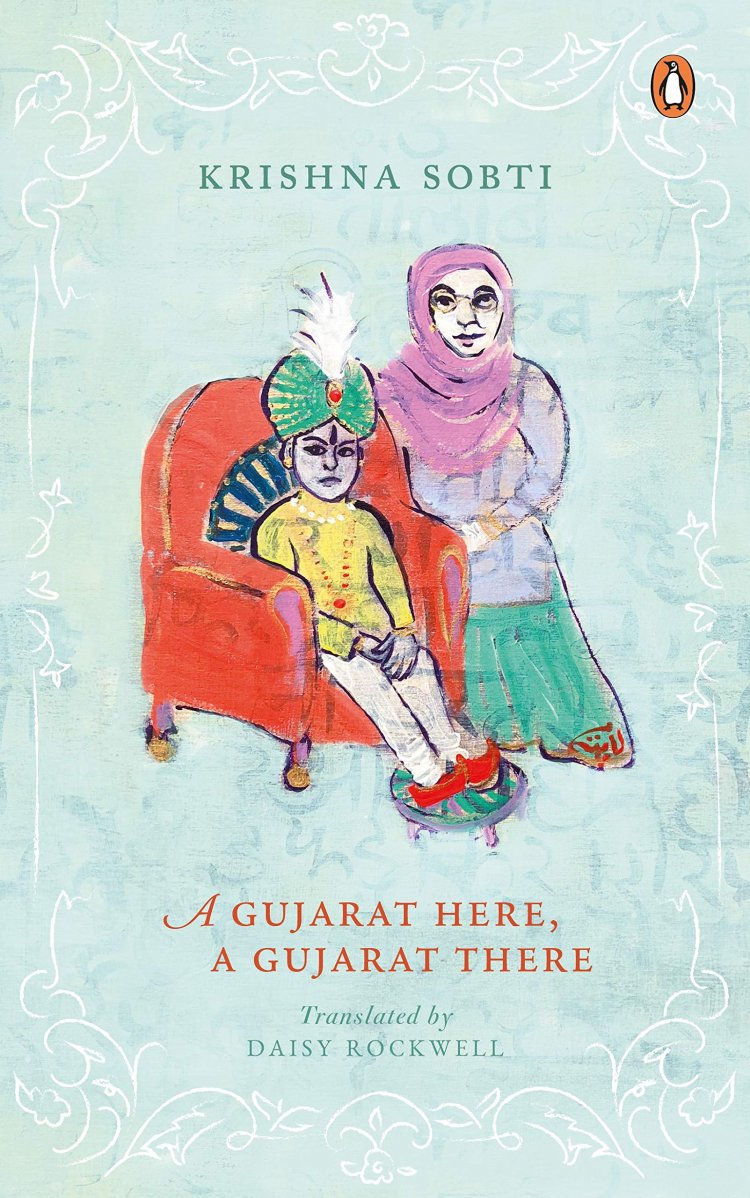A Gujarat Here, A Gujarat There

Rating: 4.6/5
Author: Krishna Sobti
Publisher: Penguin Books India
Publishing Date: 2019
Language: English (Translated by Daisy Rockwell)
Genre: Political Fiction
ISBN-10: 0670091197
ISBN-13: 978-0670091195
Format: Paperback
Pages: 272
Cost: Rs. 285 (Kindle edition), Rs. 325 (Hardcover)
Plot:
Delhi, 1947: The city surges with Partition refugees. Eager to escape the welter of pain and confusion that surrounds her, young Krishna applies on a whim to a position at a preschool in the princely state of Sirohi, which itself is on the cusp of transitioning into the republic of India. She is greeted on arrival with condescension for her refugee status and treated with sexist disdain by Zutshi Sahib, the man charged with hiring for the position.
Undaunted, Krishna fights back. But when an opportunity to become governess to the child maharaja Tej Singh Bahadur presents itself - and with it a chance to make Sirohi her new home once and for all - there is no telling how long this idyll will last.
Review:
Part novel, part memoir, part feminist anthem, ‘A Gujarat Here, A Gujarat There’ is not only a powerful tale of partition, loss and dislocation but also charts the odyssey of a spirited young woman determined to build a new identity for herself on her own terms.
The story is set way back in 1947. A young Krishna and her family are now in India. The country is new, and they are treated as refugees. She is determined to make her own path in the world and an opportunity presents itself in the form of heading a pre-school in the Sirohi. From there, misogynistic behaviour to carving a new life for herself to finally, being the governess to the child maharaja Tej Singh Bahadur, the story lays out the path for lots of indulgence.
In leaving her family and stepping out on her own, she is constantly in a dialogue with herself. The first half calls for such moments of her inner dialogues expressing her doubts, her anticipation:
“As she took her clothes from her suitcase, she became distracted. Will I like it here? Who knows. Perhaps I’m worrying too much. Has my desire to make decisions grown weak, or does insight make one capable of sensing what is to come? Nothing is in my hands now….”
This book talks a great deal about feminism. Instances like from when Sobti chooses to walk away from home to her friends and discard aunt’s and niece’s choices, women empowerment and rights reflects throughout the book.
She straightforwardly talks about the horrors of Partition, which is from where the book gets the title from – a Gujarat with us and another Gujarat that side of the border. Another incident that highlights the disintegration of War and Partition is Sobti writing about when Lady Mountbatten and Rameshwari Nehru visits the refugee camps and how the women there were told to wear colourful dupattas to show respect for the Laat Sahiba.
It is these moments of acute, not horrific but impassioned details of after-partition scenario that provides insights into those troubled times. This book is indeed a treasure, especially for the young people who can re-visit the history, get acquainted with those conflicted times of the past.
About the Author:
Krishna Sobti (18th February, 1925 - 25th January, 2019) was born in Gujrat, Punjab, now in Pakistan. She was a Hindi fiction writer and essayist, who won the Sahitya Akademi Award in 1980 for her novel Zindaginama and in 1996, was awarded the Sahitya Akademi Fellowship: the highest award of the Akademi. In 2017, She received the Jnanpith Award for her contribution to Indian literature.
Sobti was best known for her 1966 novel Mitro Marajani, an unapologetic portrayal of a married woman's sexuality. She was also the recipient of the first Katha Chudamani Award in 1999 for Lifetime Literary Achievement, apart from winning the Shiromani Award in 1981, Hindi Academy Award in 1982, Shalaka Award of the Hindi Academy in Delhi and in 2008, her novel Samay Sargam was selected for Vyas Samman, instituted by the K. K. Birla Foundation.
She also wrote under the name Hashmat and has published Hum Hashmat, a compilation of pen portraits of writers and friends. Her other novels are Daar Se Bichchuri, Surajmukhi Andhere Ke, and Yaaron Ke Yaar. Some of her well-known short stories are Nafisa, Sikka Badal gaya, and Badalom ke ghere. A number of her works are now available in English and Urdu.
About the Translator:
Daisy Rockwell is an artist, writer and translator living in northern New England, USA. Apart from her essays on literature and art, she has written Upendranath Ashk: A Critical Biography, The Little Book of Terror and the novel Taste.
Her highly acclaimed translations include, among others, Upendranath Ashk's Falling Walls and Bhisham Sahni's Tamas, published in Penguin Classics.















































